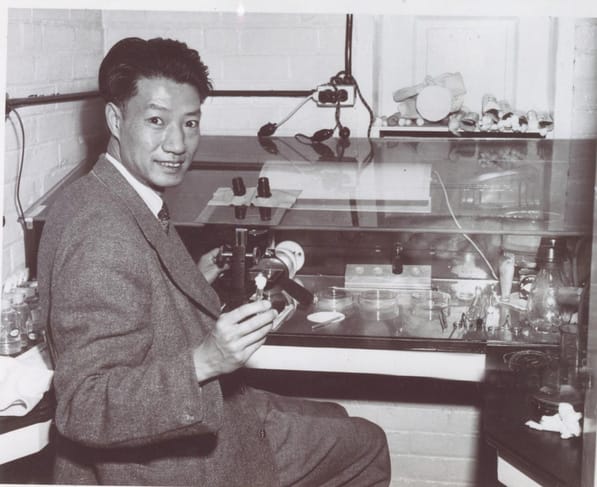“The Beauty Of Being A Scientist Is That We Can Learn A Lot”

“The beauty of being a scientist is that we can learn a lot.” - Dr. Stacy Blain, ConCarlo Therapeutics on the Found podcast
In the past few months, I’ve spent a lot of time chatting with LPs. And a question often comes up: “How do you address the issue that scientists don’t make good founders?”
This frustrating assumption comes from the commonly circulated stereotype that scientists...
Can’t leave the lab.
Can’t see beyond their academic research problems.
Don’t get people.
Aren’t pragmatic and practical.
Don’t have the “right” mindset for startups.
And my response is that not all scientists make great founders, just like not all people make great founders.
But some scientists make amazing founders.
And perhaps this common misconception results from how, in the last 20-some years, most of the types of scientists who would be great founders may have already left academia and may already be successful founders.
And we’ve just forgotten that they started as scientists.
Between 2002 and 2022 there was a 74% increase of science and engineering PhD recipients. But at the same time, research and academic institutions were losing as many as half of these scientists to jobs in business and industry. In the US specifically, these losses doubled from 24% in 2002 to 48% in 2022.
What does that mean?
48% of scientists left the lab and the pursuit of new innovative discoveries of their own.
Who enticed them to leave the lab?
L’Oreal employs as many as 4,000 researchers on staff.
Nestlé has 4,100 people working in R&D.
Johnson & Johnson employs 26,000 people in R&D, innovation, and engineering.
Not to mention SpaceX, Facebook, Netflix, Uber, DoorDash, etc.
These scientists get to work on solving problems these companies face.
And they make a f**kton of money as employees.
So back to my original supposition.
Maybe the type of scientists who would be great founders have already left academia and may already be successful founders.
In my experience, there are two major “types” of scientists: Deep Sea Divers vs. Tactical SWAT Leaders
Deep Sea Divers are the scientists that we often see portrayed in media. The Sheldon Coopers of television and pop culture.
They dive into problems, rarely coming up for air.
They allow their scientific queries to lead them on merry chases down rabbit holes.
They become absolute experts in topics and avenues of thought, both practical and theoretical.
These scientists are born to run cutting-edge research labs.
Tactical SWAT Leaders are different.
They see scientific challenges as problems to solve rather than problems to understand.
These scientists are eager to find solutions to challenges after challenges. They like applying new concepts and patterns to creatively solve problems that seem too difficult.
These are the scientists that have been hard to keep in research or academia in the last decades.
They know that their ability to solve problems can be applied to industry or to tech startups who will pay them highly for their work.
And the fast pace of the tech industry can keep their curiosity and “I can solve it” mentality engaged.
“The beauty of being a scientist is that we can learn a lot…That’s what we’ve been trained to do for decades: Look at a situation, figure out what’s important, troubleshoot and learn the appropriate things.” ConCarlo Therapeutics’s founder Dr. Stacy Blain said this on TechCrunch’s Found podcast. And she’s right.
We can learn a lot.
We like solving problems.
We like tackling challenges against the odds.
And we can learn entire new industries if we wanted to, solving business problems like science problems.
What if we could activate a Tactical SWAT Leader scientist’s problem-solving skills around the business challenges of startups?
Managing budgets.
Figuring out monetization.
Optimizing marketing funnels.
Streamlining growth.
Scaling teams.
Iterating on products based on customer engagement.
(If fact, the methodologies around A/B testing, customer feedback surveys, etc. are based on how scientists run experiments and the scientific method)
When empowered, these Tactical SWAT Leader scientists have founded some of the most household-recognizable companies.
And maybe we’ve just forgotten that they started as scientists.
- Jeff Bezos got degrees in electrical engineering and computer science before he founded Amazon.
- Ethan Brown worked on alternative energy and electricity grid restructuring before he founded Beyond Meat.
- William Emery Nickerson was an MIT-trained engineer before he designed a safety razor for King C. Gillette and co-founded the American Safety Razor Company in 1901. You know the company now as Gillette.
- AirBnB co-founder (and first CTO) Nathan Blecharczyk put himself through Harvard thanks to the profits he made from a suite of e-mail marketing products he created for spammers.
- DropBox founders Drew Houston and Arash Ferdowsi met at MIT when they were both studying computer science.
- Physicist Dr. Max Huber founded La Mer after “unlocking” the healing power of the sea in pursuit of a lotion that would heal burns he got in a lab accident. (Conspiracy theorists question this one…)
I’ve seen this in my own experiences. I am an alumna of the Research Science Institute, a gifted program hosted at MIT for young science prodigies to have the chance at working with world-class scientists before college (Google it). I also helped mentor RSI students over the years (even helping in organizing their foray into launching a similar program at KAUST in Saudi Arabia by working with female high schoolers). Over the years, more and more alumni have left academia after college or master’s programs for “tech” or startups — not in the sciences. And some of these alumni have founded some well-known startups: Pinterest, Ramp, Pawp, Pair Eyewear, etc., to name a few.
Now, what if, instead of losing these minds to non-science-related companies, we funded them to make money doing science?
Otter.ai was co-founded by two computer scientists, Dr. Sam Liang and Dr. Yun Fu.
All seven of Desktop Metal’s co-founders have backgrounds in science and engineering.
And of course Nvidia, recently named the 2nd most valuable company on earth, has engineer Jensen Huang as founder.
So, here at Skeleton Key, we’re looking for and empowering the next generation of Tactical SWAT Leader scientists who want to make money with science.
By challenging them with not only scientific problems but business problems.
By helping to give them the context and the parameters that transform scaling a science-related business into the kinds of tactical problems they love solving.
By giving them the frameworks so that they can thrive doing what they do best.
Maybe the money that has enticed scientists from their labs in the past can power the discoveries of tomorrow, slowing the scientific brain drain that we’ve been seeing for the last twenty years.
And, in so doing, maybe we together can unlock a new era of inherently venture-backable science companies.




